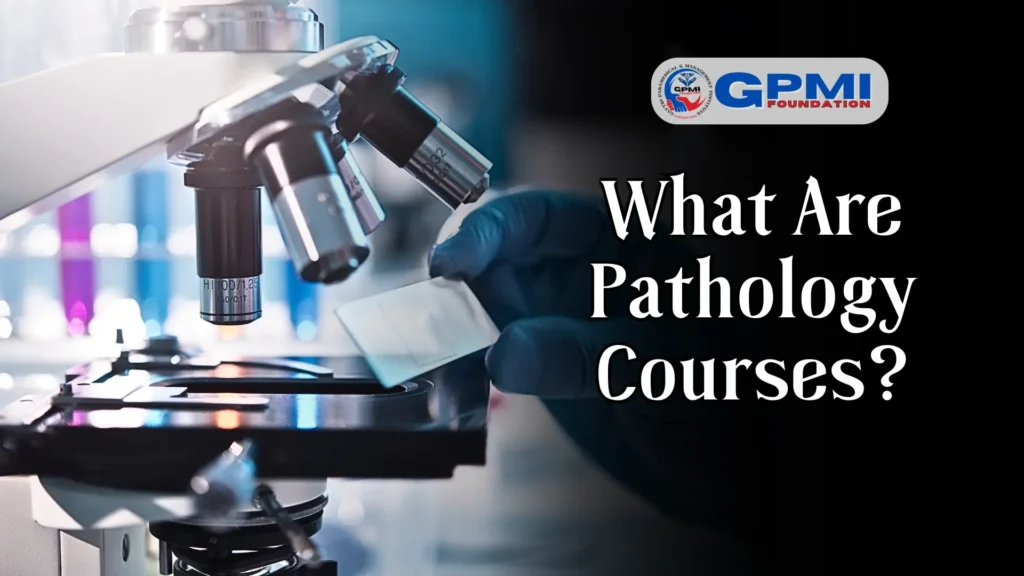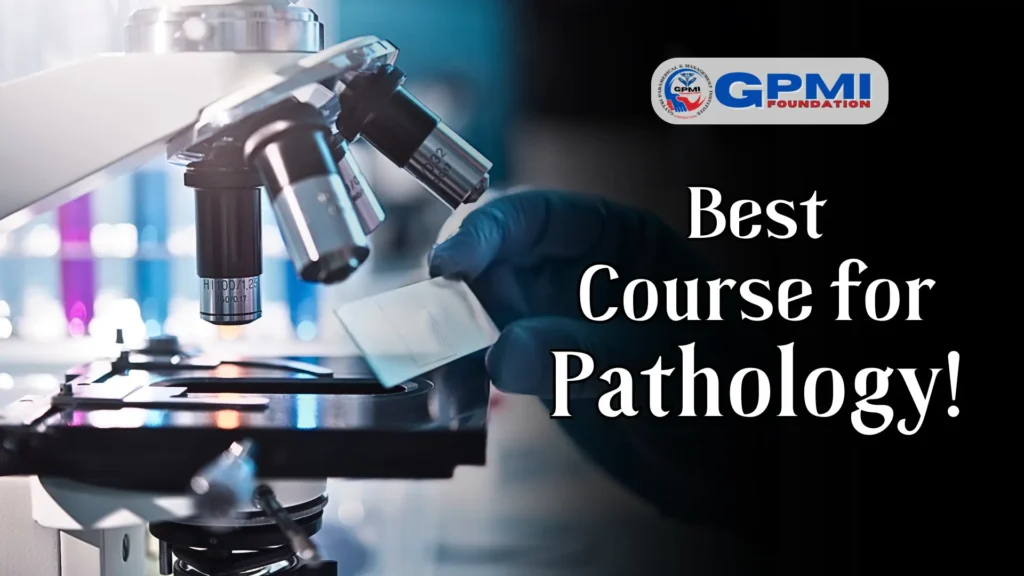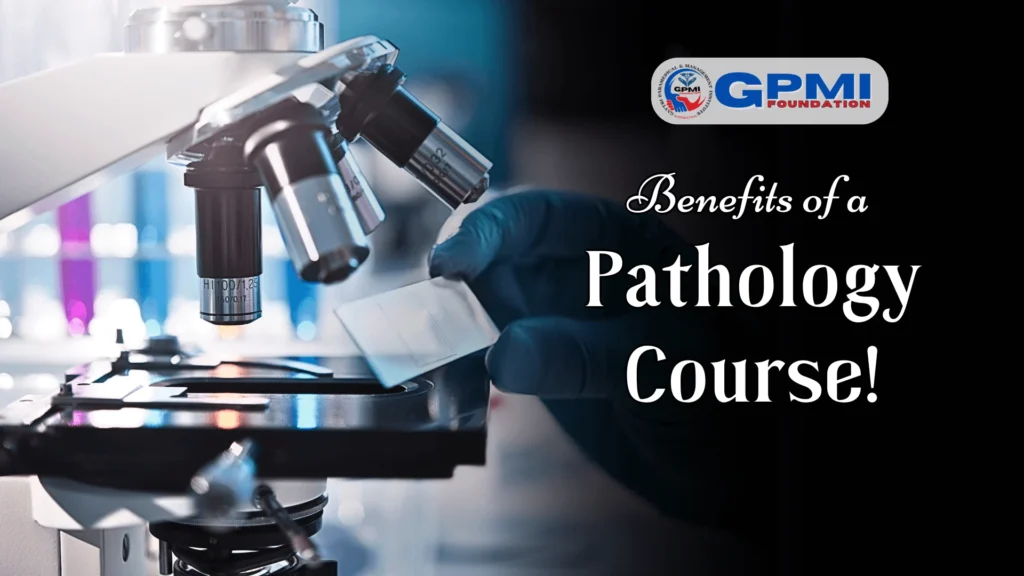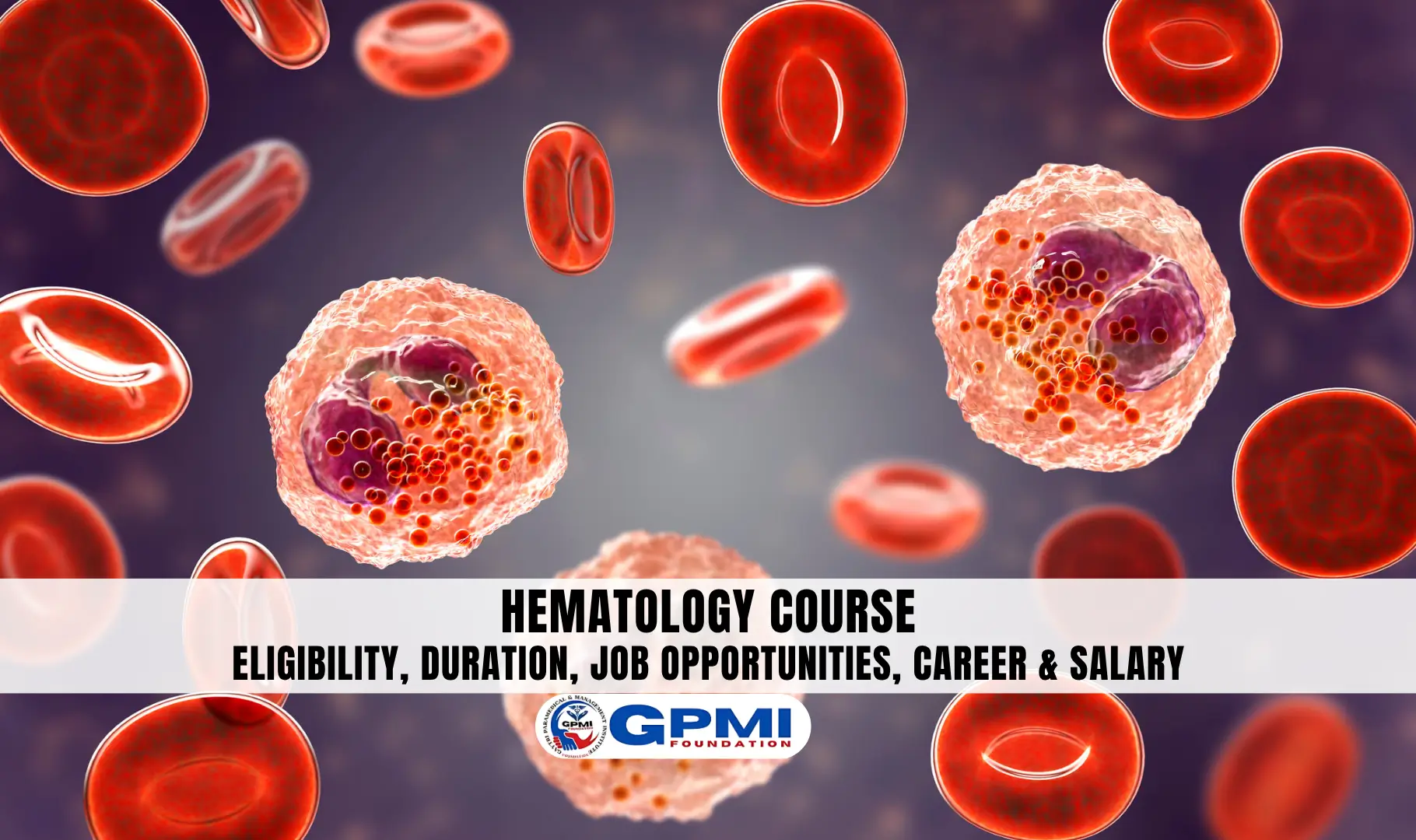Pathology is crucial in medical diagnostics, helping doctors detect diseases through laboratory tests. A Pathology Course equips students with the skills to analyze blood, tissue, and body fluids, making them vital members of the healthcare system.
Many people searching for a pathology laboratory near me on maps for a pathology test may not realize the expertise required for these services. This growing field offers career opportunities in hospitals, diagnostic labs, and research centers.
This article will explore the career scope, eligibility criteria, and benefits of pursuing a pathology course.
Table of Contents
What is Pathology?
Pathology is the branch of medical science that focuses on diagnosing diseases by studying blood, tissue, and body fluids. It helps doctors understand the cause, nature, and effects of various illnesses through laboratory tests.
Pathologists and lab technicians analyze samples to detect infections, genetic disorders, and other health conditions like Lal Pathology. Pathology is essential in modern healthcare, as it guides treatment decisions and disease prevention.
Whether you’ve searched for a pathology lab near me for a test or needed medical reports, pathology plays a vital role in delivering accurate diagnoses and improving patient care.
What is Pathology Course?

A Lab Pathology course teaches students how to diagnose diseases by studying blood, tissues, and other body fluids. It covers subjects like Microbiology, Biochemistry, Hematology, and Histopathology. Students learn how to use microscopes, lab equipment, and diagnostic techniques to detect infections, cancers, and other health conditions.
Pathology courses are available as diplomas, bachelor’s, and master’s degrees. Common options include a Diploma in Medical Lab Technology (DMLT) and B.Voc. in Medical Lab Technology (MLT).
Graduates can work as Lab Technicians, Pathology Assistants, or Medical Lab Scientists in hospitals, diagnostic labs, and research centers. The course is ideal for students interested in healthcare, laboratory science, and disease diagnosis. No surgery is involved, but lab precision is crucial.
B.Voc & BSc Pathology Course Details
Pathology is a crucial field in medical science focused on disease diagnosis through laboratory testing. This section provides detailed insights into the course structure, eligibility, subjects, and career opportunities.
Pathology Course Name
The course name depends on the level of study. Here are some common Pathology Course Names:
- Diploma in Medical Lab Technology (DMLT) – 1-2 years
- Bachelor of Vocation (B.Voc.) in Medical Lab Technology (MLT) – 3 years
- Bachelor of Science (B.Sc.) in Medical Lab Technology – 3 years
- Post Graduate Diploma in Medical Lab Technology (PGDMLT) – 2 years
- Master’s in Pathology (MD, M.Sc.) – For advanced specialization
Pathology Course Fees
The fees for a Pathology Course vary based on the level of study, institution, and location. Below is a general fee range:
- Diploma in Medical Lab Technology (DMLT): ₹30,000 – ₹1,00,000 (1-2 years)
- B.Voc./B.Sc. in Medical Lab Technology (MLT): ₹50,000 – ₹3,00,000 (3 years)
- PG Diploma in Medical Lab Technology (PGDMLT): ₹40,000 – ₹2,00,000 (2 years)
- M.Sc. in Pathology: ₹1,00,000 – ₹5,00,000 (2 years)
- MD in Pathology: ₹5,00,000 – ₹25,00,000 (3 years)
Fees vary for government and private institutions.
Pathology Course Fees in Private Colleges
The fees for Pathology Courses in private colleges vary based on the course level, institute reputation, and location. Below is an approximate fee range:
- Diploma in Medical Lab Technology (DMLT) (1-2 years): ₹50,000 – ₹1,50,000
- B.Voc./B.Sc. in Medical Lab Technology (MLT) (3 years): ₹1,00,000 – ₹4,00,000
- Post Graduate Diploma in Medical Lab Technology (PGDMLT) (2 years): ₹80,000 – ₹2,50,000
- M.Sc. in Pathology (2 years): ₹2,00,000 – ₹6,00,000
- MD in Pathology (3 years): ₹10,00,000 – ₹25,00,000
Fees may be higher in reputed private colleges.
Pathology Course Eligibility
Eligibility for a Pathology Course depends on the level of study:
- Diploma in Medical Lab Technology (DMLT) – 10th or 12th pass (Science preferred) Arts or Commerce Students may apply
- B.Voc./B.Sc. in Medical Lab Technology (MLT) – 12th pass for B.Voc.MLT / 12th pass with science for B.Sc.MLT
- Post Graduate Diploma in Medical Lab Technology (PGDMLT) – B.Sc. in Chemistry, Biochemistry, Biotechnology, or related fields (Minimum 40% marks)
- M.Sc. in Pathology – B.Sc. in MLT, Biology, or related subjects
- MD in Pathology – MBBS degree from a recognized institution
Some institutes may have entrance exams, while others allow direct admission.
Pathology Course Duration
The duration of a Pathology Course depends on the level of study:
- Diploma in Medical Lab Technology (DMLT) – 1 to 2 years
- B.Voc./B.Sc. in Medical Lab Technology (MLT) – 3 years
- Post Graduate Diploma in Medical Lab Technology (PGDMLT) – 2 years
- M.Sc. in Pathology – 2 years
- MD in Pathology – 3 years
The duration may vary based on the institution and country.
Pathology Course Salary
The salary after completing a Pathology Course depends on qualification, experience, and job role. Here’s an approximate salary range:
- Diploma in Medical Lab Technology (DMLT): ₹1.8 – ₹3.5 LPA
- B.Voc./B.Sc. in Medical Lab Technology (MLT): ₹2.5 – ₹5 LPA
- PG Diploma in Medical Lab Technology (PGDMLT): ₹3 – ₹6 LPA
- M.Sc. in Pathology: ₹4 – ₹8 LPA
- MD in Pathology: ₹8 – ₹20 LPA
Salaries increase with experience and specialization.
Which Course is Best for Pathology?
To choose the best Pathology Course, consider your education level, career goals, and the time you can invest in studying. Here’s a breakdown:

1. For Quick Entry (After 10th or 12th)
If You Want a Quick Entry into Pathology Labs (After 10th or 12th) or If you want to start working early, diploma courses are a good option:
- Diploma in Medical Lab Technology (DMLT) (1-2 years) – Covers basic pathology lab techniques, blood testing, and microbiology. Ideal for working in small diagnostic labs, clinics, and hospitals.
- Certificate Courses in Medical Lab Technology (6 months – 1 year) – Short-term courses that help in getting assistant lab technician jobs.
2. For a Stable Career After 12th
If You Want a Stable Career in Pathology. For better job opportunities and growth, a degree course is recommended:
- B.Voc. in Medical Lab Technology (MLT) (3 years) – Focuses on advanced lab techniques, microbiology, and clinical chemistry. Offers career stability and growth in hospitals, labs, and research centers.
- B.Sc. in Medical Lab Technology (MLT) (3 years) – Similar to B.Voc., but with more emphasis on theoretical knowledge.
3. For Senior Positions or Specialization (After Graduation)
If You Want Senior Positions or Specialization. For those looking for higher salaries and specialized roles:
- Post Graduate Diploma in Medical Lab Technology (PGDMLT) (2 years) – Advanced course for lab technologists who want higher positions in pathology labs.
- M.Sc. in Pathology (2 years) – Best for those interested in research, teaching, or high-level lab work.
4. To Become a Certified Pathologist (After MBBS)
If You Want to Become a Certified Pathologist. To diagnose diseases and run pathology labs:
- MD in Pathology (3 years) – A mandatory course for MBBS graduates who want to become pathologists, work in hospitals, or start their own labs.
How to Do Pathology Course?
The admission process for a Pathology Course depends on the course level (Diploma, Undergraduate, Postgraduate, or MD). Below is a step-by-step guide:
1. Choose the Right Pathology Course
First, decide which course fits your education level and career goals:
- Diploma in Medical Lab Technology (DMLT) (1-2 years)
- B.Voc./B.Sc. in Medical Lab Technology (MLT) (3 years)
- Post Graduate Diploma in Medical Lab Technology (PGDMLT) (2 years)
- M.Sc. in Pathology (2 years)
- MD in Pathology (3 years)
2. Check Eligibility Criteria
Each course has specific eligibility requirements. Ensure you meet them before applying:
- Diploma (DMLT) – Minimum 10th or 12th pass
- B.Voc./B.Sc. (MLT) – 12th pass (Science – PCB/PCM for B.Sc) with minimum 40-50% marks
- PGDMLT – B.Sc. in Chemistry, Biochemistry, Biotechnology, or MLT with at least 40% marks
- M.Sc. Pathology – B.Sc. MLT or related degree with minimum 50% marks
- MD Pathology – MBBS degree with a valid NEET PG score
3. Select a College or University
Choose a recognized college affiliated with UGC, AICTE, or MCI. Some top private and government colleges for pathology courses include:
- AIIMS, Delhi
- GPMI Foundation
- Christian Medical College (CMC), Vellore
- Kasturba Medical College, Manipal
- Manipal University
- Lovely Professional University
- Amity University
- Government and Private Paramedical Institutes
4. Entrance Exam or Direct Admission?
The admission process varies depending on the course:
- Diploma (DMLT) – Direct Admission in most private colleges
- B.Voc./B.Sc. MLT – Direct Admission or merit-based selection in private colleges, while some universities conduct entrance exams
- PGDMLT & M.Sc. Pathology – Direct Admission or university-level entrance exam
- MD in Pathology – NEET PG Exam required for government and top private medical colleges
Apply for Direct Admission
- Visit the college website or admission office.
- Fill out the application form online or offline.
- Submit the required documents (listed below).
- Pay the application fee.
- Await confirmation from the college.
Apply For Entrance Exam-Based Admission
- Register for the required entrance exam.
- Appear for the exam and secure the required cutoff marks.
- Participate in counseling (if applicable).
- Select a college based on merit and seat availability.
5. Required Documents for Admission
Students need to submit:
✔ 10th & 12th Mark Sheets & Certificates
✔ Transfer Certificate (TC)
✔ Character Certificate
✔ Entrance Exam Scorecard (if applicable)
✔ Graduation Degree & Mark Sheets (for PG Courses)
✔ Caste & Domicile Certificate (if applicable)
✔ Passport-size Photos
✔ ID Proof (Aadhar/PAN Card)
6. Pay Fees & Complete Admission Formalities
Once selected, students must:
✅ Pay the first-year tuition fees
✅ Submit the required documents for verification
✅ Complete any medical check-ups (for MD Pathology)
✅ Receive the admission confirmation letter
After completing the admission process, you are a confirmed student of the institute or college. Students can begin classes, attend laboratory training, and gain practical experience in pathology techniques.
Career Scopes After Completing Pathology Course!
Pathology offers a wide range of career opportunities, depending on the level of the course you complete. Here’s a breakdown of potential job roles and work settings:

1. Career Opportunities Based on Course Level
A. After Diploma in Medical Lab Technology (DMLT) (1-2 years)
- Medical Lab Technician – Work in hospitals, pathology labs, and diagnostic centers.
- Lab Assistant – Support pathologists in sample collection and test processing.
- Phlebotomist – Specializes in blood sample collection for tests.
- Research Lab Assistant – Worked in medical and pharmaceutical research labs.
- Technician in Blood Banks – Handle blood collection, testing, and storage.
B. After B.Voc./B.Sc. in Medical Lab Technology (MLT) (3 years)
- Medical Lab Technologist – Conduct advanced diagnostic tests in pathology labs.
- Quality Control Technician – Ensure lab tests meet medical standards.
- Pathology Lab Manager – Supervise lab technicians and manage daily operations.
- Microbiologist Assistant – Work with infectious disease testing and research.
- Forensic Lab Technician – Assist in criminal investigations with lab testing.
C. After PGDMLT or M.Sc. in Pathology
- Senior Medical Lab Technologist – Perform specialized tests in pathology labs.
- Research Scientist – Work in medical research, drug testing, and biotechnology.
- Medical Lab Consultant – Provide expertise in lab technology and management.
- Hospital Pathology Coordinator – Oversee lab operations in hospitals.
- Clinical Application Specialist – Train professionals in diagnostic technologies.
D. After MD in Pathology (3 years) (For MBBS Graduates)
- Pathologist – Diagnose diseases by analyzing blood, tissues, and fluids.
- Cytopathologist – Specializes in cancer diagnosis through cell analysis.
- Forensic Pathologist – Conduct post-mortems for legal investigations.
- Histopathologist – Study tissue samples for disease detection.
- Medical Examiner – Work in law enforcement to determine causes of death.
2. Industries & Workplaces
Graduates from pathology courses can find jobs in:
Hospitals & Clinics – Private and government hospitals hire lab technicians and pathologists.
Diagnostic Centers & Pathology Labs – Work with labs like Dr. Lal PathLabs, SRL Diagnostics, and Metropolis.
Blood Banks – Manage blood donation and storage.
Forensic Laboratories – Assist in criminal investigations.
Pharmaceutical & Research Labs – Conduct drug testing and clinical trials.
Medical Colleges & Universities – Teach pathology and conduct research.
Corporate Healthcare Companies – Work with diagnostic equipment manufacturers.
3. Salary Expectations
- DMLT Holders – ₹15,000 – ₹30,000 per month
- B.Voc./B.Sc. MLT Graduates – ₹25,000 – ₹50,000 per month
- PGDMLT/M.Sc. Pathology – ₹40,000 – ₹80,000 per month
- MD Pathologist – ₹80,000 – ₹2,00,000 per month
4. Self-Employment & Business Opportunities
With experience, professionals can start their own pathology lab, diagnostic center, or blood collection service.
Benefits Of a Pathology Course!
A Pathology Course offers numerous benefits, from job security to career growth. Here’s why pursuing a pathology-related course is a great choice:

- High Demand in the Healthcare Industry
- Pathology is essential for diagnosing diseases, and medical lab technicians and pathologists are in high demand.
- The need for skilled professionals is increasing with the rise of hospitals, diagnostic centers, and research labs.
- Multiple Career Options
- After completing a pathology course, you can work as a Lab Technician, Pathologist, Blood Bank Technician, Research Scientist, or Forensic Expert.
- You can find jobs in hospitals, pathology labs, blood banks, research centers, and pharmaceutical companies.
- Good Salary & Career Growth
- Entry-level salaries range from ₹15,000-₹30,000 per month for diploma holders and ₹25,000-₹50,000 per month for degree holders.
- Experienced professionals and MD Pathologists earn ₹80,000 – ₹2,00,000 per month.
- With experience, you can get promoted to Lab Manager, Research Head, or Senior Pathologist.
- Opportunity for Self-Employment
- You can open your own pathology lab or diagnostic center after gaining experience and necessary certifications.
- A well-established lab can generate stable and high income.
- Short Duration & Job-Ready Skills
- Diploma courses (DMLT) take 1-2 years, while B.Sc./B.Voc. MLT takes 3 years, making it a quick route to employment.
- The course includes hands-on training in pathology labs, ensuring students are job-ready after graduation.
- Contribution to Healthcare & Society
- Pathology professionals help detect and prevent diseases, playing a key role in patient care.
- They assist in diagnosing conditions like cancer, infections, and blood disorders, leading to effective treatments.
- Further Studies & Specialization Opportunities
- Students can pursue M.Sc. Pathology, PGDMLT, or MD Pathology for higher positions and specialized roles.
- Specializations in Hematology, Microbiology, Histopathology, and Clinical Research open more career doors.
Conclusion
A Pathology Course offers a promising career in the healthcare sector, with opportunities in hospitals, diagnostic labs, research centers, and the pharmaceutical industry.
Whether you choose a diploma, bachelor’s, or advanced degree, this field provides job stability, good salary prospects, and career growth. Eligibility varies based on the course level, and students can specialize further for higher positions.
With the increasing demand for diagnostic services, pathology professionals play a crucial role in disease detection and patient care. If you are interested in laboratory sciences and medical diagnostics, pursuing a pathology course can lead to a rewarding and impactful career.
Frequently Asked Question
Here are some frequently asked questions to provide you with detailed and refined information about the course.
For pathology laboratory which course is best?
(After 10th or 12th):- Diploma in Medical Lab Technology (DMLT)
B.Voc. in Medical Lab Technology (MLT)
(After Graduation):- (PGDMLT) (2 years)
M.Sc. in Pathology (2 years)
(After MBBS):- MD in Pathology (3 years)
Is a pathologist a doctor?
Yes, a pathologist is a doctor. They are medical professionals with an MBBS degree followed by an MD in Pathology. Pathologists diagnose diseases by analyzing blood, tissues, and body fluids. They play a crucial role in medical diagnosis and treatment planning.
Does pathology require NEET?
For a Diploma in MLT – NEET is NOT required.
For MD in Pathology – NEET-PG is required.
For B.Sc. or B.Voc. in (MLT) – NEET is NOT required.
Can I do the pathology course after 12th?
Yes, you can pursue pathology-related courses after 12th without NEET. Here are your options:
- B.Sc. in Medical Lab Technology (MLT) – 3 years
- B.Voc. in Medical Lab Technology (MLT) – 3 years
- Diploma in Medical Lab Technology (DMLT) – 1-2 years
- Certificate Courses in Pathology Lab Technology – 6 months to 1 year
What are the 4 types of pathology?
Molecular Pathology – Studies diseases at the molecular and genetic level to develop targeted treatments
Anatomical Pathology – Focuses on diagnosing diseases by examining tissues, organs, and cells
Clinical Pathology – Involves lab analysis of blood, urine, and other body fluids to diagnose diseases
Forensic Pathology – Deals with determining the cause of death through autopsies and medical examinations in legal cases.
Can I open a lab after my BSc pathology?
No, you cannot open a pathology lab independently after B.Sc. in Pathology or (MLT). However, you can work in a lab as a Lab Technician or Manager.
To open a pathology Lab…
Get NABL Accreditation (Optional) – To enhance credibility and trust.
Hire a Certified Pathologist (MD in Pathology) – A lab must be supervised
Obtain Necessary Licenses – Apply for Clinical Establishment Act Registration, Biomedical Waste Management License, and other approvals.







